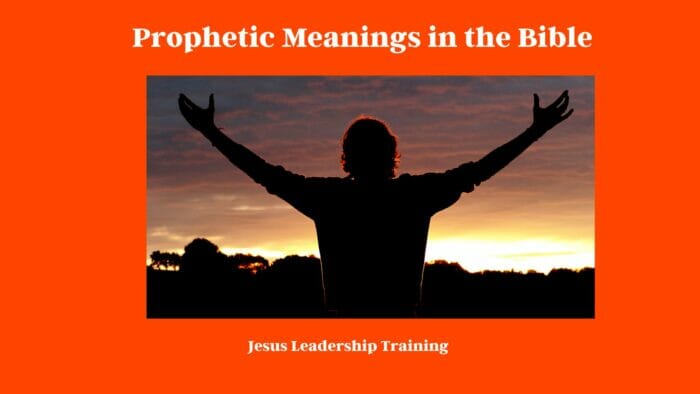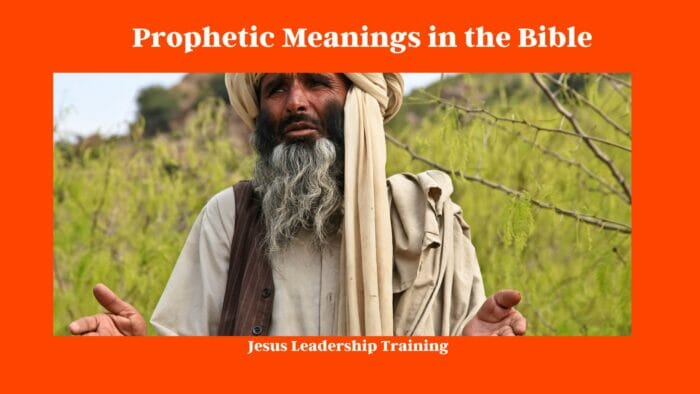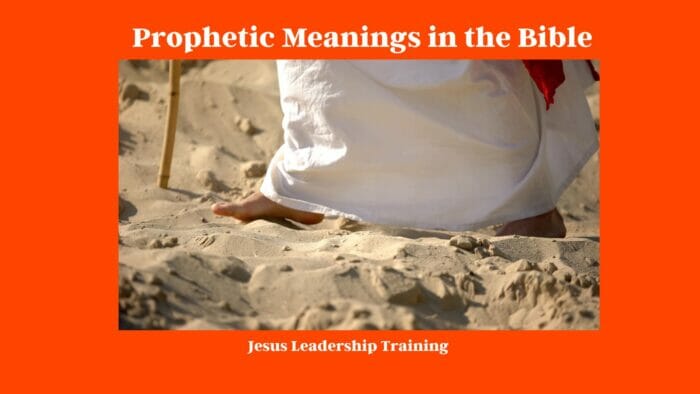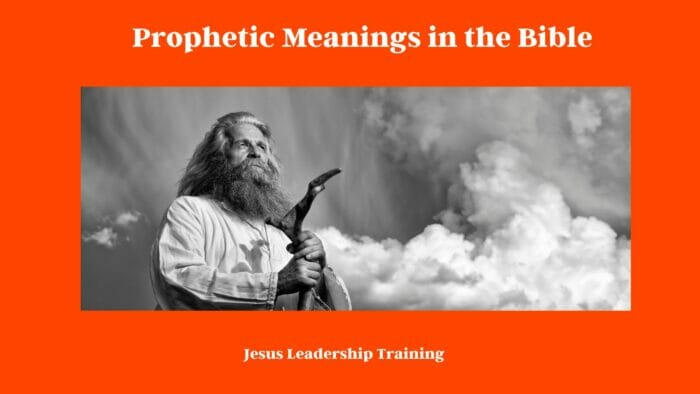Prophetic Meanings in the Bible – The Bible, regarded as a sacred text by billions of people worldwide, holds a wealth of wisdom, guidance, and prophecies. The Prophetic Meanings in the Bible delve into the hidden messages and symbolic interpretations found within its verses.
These profound insights provide believers with a deeper understanding of God’s plan and offer guidance for navigating life’s challenges. In this article, we will explore various prophetic meanings in the Bible, uncovering the profound truths they hold and their significance in our lives.
Table of Contents
Prophetic Meanings in the Bible: A Closer Look (Vocabulary Lists)
Prophetic meanings in the Bible refer to symbolic interpretations and hidden messages conveyed through the text. These meanings are often revealed through metaphors, parables, and vivid imagery. Understanding the prophetic meanings requires careful analysis and interpretation, taking into account historical context, cultural nuances, and biblical symbolism. Let’s explore some of the fascinating prophetic meanings in the Bible:
1. The Lion of Judah: Symbol of Strength and Kingship
The phrase “Lion of Judah” appears in the Book of Revelation (5:5) and refers to Jesus Christ. The lion symbolizes strength, courage, and kingship. By describing Jesus as the Lion of Judah, the Bible portrays Him as the ultimate ruler and conqueror.
2. The Fig Tree: Symbol of Israel’s Restoration
In the Gospel of Matthew (24:32), Jesus uses the fig tree as a metaphor for the restoration of Israel. Just as the fig tree sprouts leaves, signaling the approach of summer, the reestablishment of Israel as a nation is seen as a significant prophetic fulfillment.

3. The Four Horsemen of the Apocalypse: Symbols of Divine Judgment
In the Book of Revelation (6:1-8), the Four Horsemen of the Apocalypse are described as riders on white, red, black, and pale horses, representing conquest, war, famine, and death. These symbols convey the divine judgment and the consequences of humanity’s actions.
4. The Valley of Dry Bones: Symbol of Spiritual Restoration
The vision of the Valley of Dry Bones in the Book of Ezekiel (37:1-14) portrays a desolate valley filled with lifeless bones. This prophetic image symbolizes the spiritual restoration and revival of the people of Israel, highlighting God’s power to breathe life into the spiritually dead.
5. The Beast: Symbol of Oppression and Evil
In the Book of Daniel (7:1-28) and the Book of Revelation (13:1-18), the Beast represents a tyrannical ruler or system that opposes God’s people. This prophetic symbol warns of the oppressive forces and evil that believers may encounter.
6. The Olive Tree: Symbol of Spiritual Nourishment
The olive tree holds significant symbolic meaning throughout the Bible. It represents spiritual nourishment, peace, and prosperity. In Romans 11:17-24, the olive tree serves as an analogy for believers, emphasizing the importance of remaining rooted in faith and bearing spiritual fruit.

Introduction to Biblical Prophecy (English)
Biblical prophecy, an integral part of religious scripture, forms the cornerstone of Judeo-Christian tradition. Rooted in the word of God, these divinations serve as an invaluable bridge between divine intent and human understanding.
The Nature of Biblical Prophecy (Prophetic)
Prophecy in the Bible is not merely predictive. Instead, it encompasses a divine message communicated through prophets, often concerned with societal reform and spiritual instruction. Broadly, biblical prophecies are classified into two types: forthtelling and foretelling.
Types of Biblical Prophecy
Forthtelling Prophecy (Dictionary)
Forthtelling, or preaching, involves the prophet conveying God’s will to the people. It centers on the present, guiding society in matters of morality and justice.
The Prophetic Call
The prophetic call is the moment of divine selection, where individuals are chosen to deliver God’s message. This spiritual calling is central to forthtelling prophecy, as seen in the cases of Moses, Isaiah, and Jeremiah.
Ethical and Social Messages (Video)
In forthtelling prophecies, prophets often impart ethical teachings and social commentaries. From decrying injustice to urging repentance, these prophecies seek to mold a righteous society.

Foretelling Prophecy
Foretelling, on the other hand, is predictive prophecy. It pertains to future events, often with significant religious implications.
Messianic Prophecies
Messianic prophecies foretell the coming of the Messiah. Central to Christian belief, these prophecies in the Old Testament are believed to have been fulfilled in the life, death, and resurrection of Jesus Christ.
Table of Messianic Prophecies
| Prophecy | Scripture Reference | Fulfillment |
|---|---|---|
| Born of a Virgin | Isaiah 7:14 | Fulfilled in the birth of Jesus (Matthew 1:22-23) |
| Descendant of David | Isaiah 9:7; Jeremiah 23:5-6 | Fulfilled in Jesus’ lineage (Matthew 1:1) |
| Born in Bethlehem | Micah 5:2 | Fulfilled in Jesus’ birthplace (Matthew 2:1-6) |
| Ministry in Galilee | Isaiah 9:1-2 | Fulfilled by Jesus’ ministry (Matthew 4:12-17) |
| Triumphal Entry | Zechariah 9:9 | Fulfilled in Jesus’ entry into Jerusalem (Matthew 21:1-11) |
| Betrayed by a Friend | Psalm 41:9 | Fulfilled by Judas’ betrayal (Matthew 26:14-16, 47-50) |
| Sold for 30 Pieces of Silver | Zechariah 11:12 | Fulfilled by Judas’ betrayal (Matthew 26:15) |
| Crucifixion | Psalm 22:16; Isaiah 53:5 | Fulfilled in Jesus’ crucifixion (Matthew 27:32-50) |
| Pierced Hands and Feet | Psalm 22:16; Zechariah 12:10 | Fulfilled in Jesus’ crucifixion (John 19:34, 37) |
| Resurrection | Psalm 16:10; Isaiah 53:10-11 | Fulfilled in Jesus’ resurrection (Matthew 28:5-7) |
| Ascension | Psalm 68:18; Acts 1:9-11 | Fulfilled in Jesus’ ascension (Luke 24:51; Acts 1:9-11) |
| High Priest | Psalm 110:4; Hebrews 5:5-6 | Fulfilled in Jesus as our eternal High Priest (Hebrews 7:17-21) |
| Reigning Forever | Daniel 7:13-14; Isaiah 9:7 | Fulfilled in Jesus’ eternal reign (Luke 1:32-33) |
| Second Coming | Zechariah 14:4; Revelation 19:11-16 | Yet to be fulfilled, awaiting Jesus’ return |
The table above provides a comprehensive list of messianic prophecies found in the Old Testament and their fulfillment in the life, ministry, death, and resurrection of Jesus Christ. These prophecies serve as compelling evidence of Jesus’ divine identity as the long-awaited Messiah.
Through His life and work, Jesus fulfilled the promises made by God, bringing salvation and redemption to humanity. As believers, we can find assurance and hope in the fulfillment of these prophecies, trusting in the Messiah who was promised and has come.
Eschatological Prophecies
Eschatological prophecies concern the ‘end times’ or the ultimate destiny of humanity. These prophecies, found in books like Daniel and Revelation, explore themes of divine judgment and final redemption.
Table of Eschatological Prophecies
| Prophecy | Scripture Reference | Description |
|---|---|---|
| The Great Tribulation | Matthew 24:21-22; Revelation 7:14 | A period of unprecedented tribulation and persecution before Christ’s return |
| The Antichrist | 1 John 2:18; 2 Thessalonians 2:3-4 | A figure who opposes Christ and deceives many with false teachings |
| The Abomination of Desolation | Daniel 9:27; Matthew 24:15 | A sacrilegious act committed in the holy place, signaling imminent judgment |
| The Second Coming | Matthew 24:30-31; Revelation 19:11-16 | The return of Jesus Christ in power and glory to establish His kingdom |
| The Resurrection of the Dead | 1 Corinthians 15:51-52; 1 Thessalonians 4:16-17 | The raising of believers who have died, and their transformation into immortal bodies |
| The Judgment Seat of Christ | 2 Corinthians 5:10; Romans 14:10 | The evaluation of believers’ works by Christ, determining rewards and responsibilities |
| The Millennial Reign | Revelation 20:4-6; Isaiah 11:6-9 | A thousand-year reign of Christ on Earth, characterized by peace and righteousness |
| The Battle of Armageddon | Revelation 16:16; Revelation 19:19-21 | The final conflict between the forces of evil and the returning Christ |
| The New Heaven and New Earth | Revelation 21:1-5; 2 Peter 3:13 | The creation of a new, perfect, and eternal dwelling place for believers |
| The Final Judgment | Revelation 20:11-15; Matthew 25:31-46 | The judgment of all people, determining their eternal destiny based on their deeds |
| The Eternal State | Revelation 21:3-4; Revelation 22:5 | The ultimate fulfillment of God’s plan, where believers dwell with Him forever |
The table above presents a collection of eschatological prophecies found in the Bible, offering insights into the end times and the final culmination of God’s plan for humanity.
These prophecies provide a glimpse into the future events that will unfold, including the Great Tribulation, the rise of the Antichrist, the Second Coming of Christ, the resurrection of the dead, and the establishment of the millennial reign.
They also highlight the ultimate judgment of all people, the creation of a new heaven and new earth, and the eternal state where believers will dwell with God in perfect harmony. These prophecies serve as a reminder of the hope and assurance we have as believers, knowing that God is in control of the future and that His promises will be fulfilled.
Key Prophets in the Bible
Major Prophets:
The Major Prophets refer to a group of prominent figures in the Bible who are known for their extensive writings and significant impact on the religious and historical narrative. This group comprises four well-known prophets:
- Isaiah: Isaiah is revered as one of the greatest prophets in the Old Testament. His prophecies are compiled in the Book of Isaiah, which consists of 66 chapters. Isaiah’s messages focus on the coming Messiah, the judgment and restoration of Israel, and the future kingdom of God.
- Jeremiah: Jeremiah was called by God to deliver messages of warning and judgment to the people of Israel. His prophecies, found in the Book of Jeremiah, span 52 chapters. Jeremiah’s writings primarily address the impending Babylonian captivity and the eventual restoration of Israel.
- Lamentations: The book of Lamentations, traditionally attributed to the prophet Jeremiah, consists of poetic expressions of grief and sorrow following the destruction of Jerusalem. While Jeremiah is primarily recognized as a prophet, the book of Lamentations showcases his lamenting and reflective style.
- Ezekiel: Ezekiel, known as the prophet of the exile, prophesied during the Babylonian captivity. His prophecies, detailed in the Book of Ezekiel, contain visions, symbolic actions, and messages of judgment, restoration, and the coming of the Spirit of God.
Minor Prophets:
The Minor Prophets, although referred to as “minor,” are equally important in the biblical narrative. This group comprises twelve prophets, each with their distinctive message and style:
- Hosea: The Book of Hosea presents Hosea’s prophecies, which focus on the theme of divine love and faithfulness despite Israel’s unfaithfulness.
- Joel: Joel’s prophecies, found in the Book of Joel, revolve around the theme of the Day of the Lord—a future time of divine judgment and restoration.
- Amos: Amos delivered messages primarily addressing social injustice and religious corruption within Israel, as recorded in the Book of Amos.
- Obadiah: The shortest book among the prophets, Obadiah, contains prophecies concerning Edom’s judgment due to their mistreatment of Israel.
- Jonah: The prophet Jonah is well-known for his reluctant obedience and his mission to Nineveh, as described in the Book of Jonah. This book serves as a reminder of God’s compassion and willingness to forgive.
- Micah: Micah’s prophecies, presented in the Book of Micah, center on themes of judgment, restoration, and the coming of the Messiah.
- Nahum: The book of Nahum pronounces God’s judgment against Nineveh and serves as a sequel to the story of Jonah.
- Habakkuk: Habakkuk’s dialogue with God, recorded in the Book of Habakkuk, addresses the theological problem of why God allows wickedness to persist.
- Zephaniah: Zephaniah’s prophecies warn of the impending judgment upon Judah and the nations, emphasizing the importance of seeking righteousness.
- Haggai: Haggai’s messages, found in the Book of Haggai, encourage the Israelites to rebuild the temple in Jerusalem after their return from exile.
- Zechariah: Zechariah’s prophecies, recorded in the Book of Zechariah, contain visions, messianic prophecies, and messages of encouragement for the post-exilic community.
- Malachi: The final book of the Old Testament, Malachi, addresses issues of religious corruption, the coming of the Messiah, and the Day of the Lord.
Here is a summarized table listing all the prophets in the Bible, both Major and Minor:
| Major Prophets | Books |
|---|---|
| Isaiah | Book of Isaiah |
| Jeremiah | Book of Jeremiah |
| Lamentations | Book of Lamentations |
| Ezekiel | Book of Ezekiel |
| Minor Prophets | Books |
|---|---|
| Hosea | Book of Hosea |
| Joel | Book of Joel |
| Amos | Book of Amos |
| Obadiah | Book of Obadiah |
| Jonah | Book of Jonah |
| Micah | Book of Micah |
| Nahum | Book of Nahum |
| Habakkuk | Book of Habakkuk |
| Zephaniah | Book of Zephaniah |
| Haggai | Book of Haggai |
| Zechariah | Book of Zechariah |
| Malachi | Book of Malachi |
These prophetic figures played significant roles in shaping the religious and historical landscape of the Bible. Their messages and writings provide invaluable insights into God’s interaction with humanity, ethical guidelines, and predictions of future events.
Major Prophets
The Major Prophets—Isaiah, Jeremiah, Ezekiel, and Daniel—have substantial prophetic writings in the Bible. Their messages vary, covering forthtelling and foretelling prophecies.
Minor Prophets
The Minor Prophets, not minor in importance but in the brevity of their writings, also played significant roles. Prophets like Hosea and Micah delivered divine messages of warning and hope.
The Role of Prophecy Today
Today, biblical prophecy continues to shape faith, providing guidance and assurance to believers. It offers insights into God’s character, teachings on righteousness, and hope for the future.
Interpreting Biblical Prophecies
Interpreting biblical prophecies requires a nuanced understanding of historical, cultural, and literary contexts. This study, known as eschatology, fosters a deeper appreciation of the prophetic word.
Final Thoughts – Prophecy Meanings
Biblical prophecy, multifaceted and profound, remains a vital component of Judeo-Christian tradition. With its blend of forthtelling and foretelling elements, it enriches faith, instills moral values, and continues to inspire hope among believers.
Frequently Asked Questions
- What is the difference between forthtelling and foretelling prophecy? Forthtelling prophecies are moral teachings and societal guidelines, while foretelling prophecies predict future events.
- What is the importance of Messianic prophecies? Messianic prophecies foretell the coming of the Messiah, a belief central to Christian faith.
- Who are the Major and Minor Prophets? Major Prophets have longer prophetic writings in the Bible, while Minor Prophets have shorter ones. Both groups were instrumental in delivering God’s messages.
- How does biblical prophecy impact believers today? Biblical prophecy provides guidance, reassurance, and a deeper understanding of God’s character to believers today.
- What is eschatology? Eschatology is the study of ‘end times’ as predicted in biblical prophecy, exploring themes of divine judgment and redemption.
Frequently Asked Questions (FAQs)
FAQ 1: Are the prophetic meanings in the Bible open to personal interpretation?
Yes, the prophetic meanings in the Bible can be subject to personal interpretation. While certain prophetic symbols have widely accepted interpretations, others may have multiple possible meanings. It is crucial to approach the interpretation of prophetic passages with prayer, discernment, and an understanding of biblical principles.
FAQ 2: Do the prophetic meanings have practical relevance in our lives today?
Absolutely! The prophetic meanings in the Bible hold timeless truths that are relevant to our lives. They provide guidance, encouragement, and warnings that can help believers navigate the challenges of the present age and deepen their relationship with God.
FAQ 3: Can non-believers also benefit from understanding prophetic meanings?
Yes, even non-believers can gain insights from understanding prophetic meanings. The symbolic messages in the Bible offer valuable wisdom and shed light on the human condition, morality, and the consequences of our actions. Exploring prophetic meanings can spark curiosity, provoke contemplation, and encourage a deeper exploration of faith.
FAQ 4: How can one study and understand prophetic meanings in the Bible?
Studying prophetic meanings in the Bible requires diligent reading, prayerful reflection, and a willingness to explore various resources. Here are some steps to help you deepen your understanding:
- Read the Bible: Familiarize yourself with the biblical text and its context. Pay attention to symbolic language and recurring motifs.
- Study Commentaries: Consult reputable biblical commentaries to gain insights from scholars who have delved into the prophetic meanings.
- Pray for Guidance: Seek divine wisdom and guidance as you embark on your study of prophetic meanings.
- Engage in Discussion: Join study groups or engage in conversations with fellow believers to gain different perspectives and learn from one another.
- Utilize Online Resources: Explore online resources such as articles, videos, and podcasts that provide in-depth analysis of prophetic passages.
FAQ 5: Can prophetic meanings change over time?
While the underlying prophetic messages remain constant, the application of prophetic meanings can evolve with time. As humanity progresses and historical events unfold, new insights and applications of prophetic passages may emerge. However, it is crucial to approach these interpretations with discernment and adhere to the core teachings of the Bible.
FAQ 6: Is it possible to misinterpret prophetic meanings?
Yes, misinterpretation of prophetic meanings is possible. The symbolism and metaphorical nature of prophetic passages make them susceptible to misinterpretation if taken out of context or approached with bias. It is important to rely on sound biblical principles, scholarly resources, and prayerful discernment to minimize the risk of misinterpretation.
Other Key Thoughts
predicting
vocabulary lists
personalized learning
explore thesaurus
record staff
magazine submit
related words
enews submit
subscribe magazine
day word
testament prophecy
Final Thoughts – Prophecy Meanings
The Prophetic Meanings in the Bible offer a fascinating glimpse into the deeper layers of biblical wisdom. By exploring these hidden messages and symbolic interpretations, believers can gain profound insights into God’s plan, find guidance for their lives, and deepen their faith. While the study of prophetic meanings requires diligent effort and discernment, the rewards are immeasurable. May we approach the Bible with open hearts and minds, seeking to uncover the prophetic meanings that can enrich our spiritual journey.




